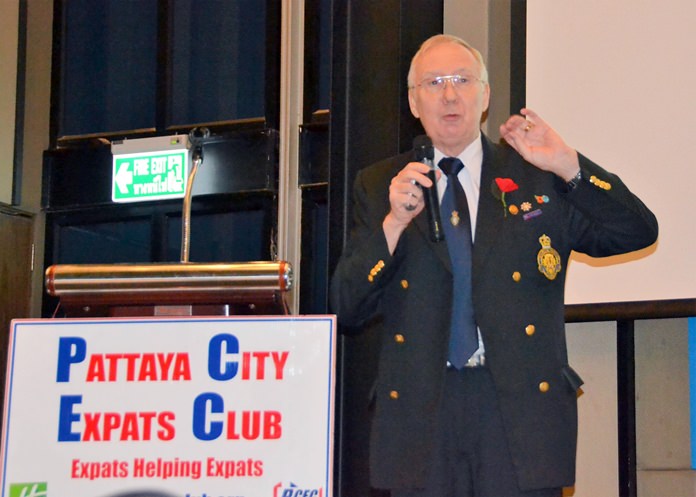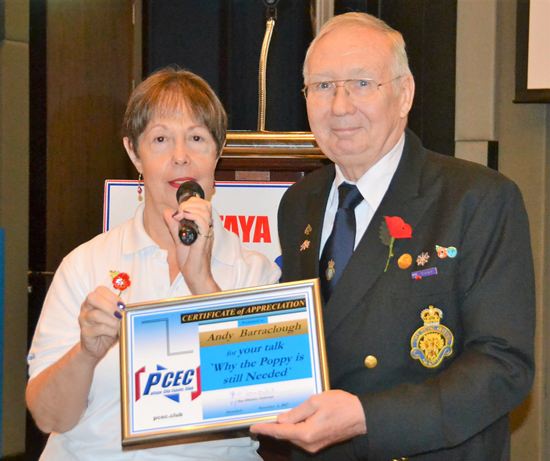
The Pattaya City Expats Club, at their meeting on Sunday 3rd November, gave a very warm welcome to Andy Barraclough – Chairman of the Royal British Legion, Chonburi Thailand Branch. With Remembrance Sunday approaching, Andy reminded the audience about the Royal British Legion’s mission around the world: ‘To provide Welfare, Comradeship, Representation and Remembrance for the Armed Forces Community’. He also spoke with pride about the important role the poppy plays in this. Andy was keen to dispel rumors and false information concerning the abandonment of the Remembrance Sunday ceremony and The Poppy Appeal, as just that – fake news.
 Almost 100 years since the end of World War 1, the poppy has become the internationally recognized symbol of Remembrance. ‘In Flanders Fields’ was written after vivid, red poppies bloomed in the Spring of 1915 on the battlefields of Belgium, France and Gallipoli. It is that life-force growing in the most difficult of circumstances that connects the poppy with a message of remembrance and hope for the Armed Forces community, past and present around the world. Brave Thai soldiers supported France in WW1. In fact, some of Thailand’s female nurses served in the trenches on the Western Front!
Almost 100 years since the end of World War 1, the poppy has become the internationally recognized symbol of Remembrance. ‘In Flanders Fields’ was written after vivid, red poppies bloomed in the Spring of 1915 on the battlefields of Belgium, France and Gallipoli. It is that life-force growing in the most difficult of circumstances that connects the poppy with a message of remembrance and hope for the Armed Forces community, past and present around the world. Brave Thai soldiers supported France in WW1. In fact, some of Thailand’s female nurses served in the trenches on the Western Front!
The Commonwealth War Graves Commission helps to maintain two of the three cemeteries at the ‘Death Railway’ site in Kanchanaburi, Thailand. One of these is at the site of the old hospital where mainly officers and Dutch service personnel were interred. The Royal British Legion regularly undertakes acts of remembrance at both sites.
Veterans from around the world are too often neglected. Even when support is available it can be very hard to access without help. Therefore, when you buy and wear a poppy, you are not just remembering the fallen: you are supporting a new generation of veterans and service personnel. Each branch of the Legion offers advice, assistance and information on matters including recuperation, employment, housing, prosthesis, etc. They lobby governments for support.
How it works: Members of the Royal British Legion get together through a network of branches – 96 of these are outside the United Kingdom. No matter where the location, they are all self-sufficient and must work to be self-funding. They participate in social, fundraising and welfare activities, and donate their proceeds to The Royal British Legion. Andy was keen to point out that this system ensures that 100% of funds raised by the Poppy Appeal go to the support of veterans, wherever that may be. In 2015 £105,000,000 was raised.
The Royal British Legion is active throughout the world, including Thailand, supporting its service personnel and pointing them in the right direction to access appropriate resources. Andy gave an astonishing example to help put this in perspective: Since 1945 there have only been two years where UK personnel had not been killed or injured in action – 1968 and 2016!
Advances in combat casualty care have resulted in coalition forces achieving the highest recorded survival rates from battlefield injury. As a consequence of this increased survivability, there are increasing numbers of casualties with more severe injuries than ever seen before, often leading to long-term disability. Thus, there exists a requirement for a greater understanding of the basic science and the fundamental mechanisms of these injuries with a view to preventing them in the future and in the treatment of them currently.
In 2011, the Royal British Legion helped fund The Centre for Blast Injury Studies, which tackles the disabling injuries of conflict with a clinically-led approach. The Centre brings together multidisciplinary collaborations from medical, engineering and scientific backgrounds around the world.

They have helped to fund Specialist Personnel Recovery Centers designed to assist wounded, injured and sick Service personnel and either helping them to return to duty or move successfully into civilian life. The Legion has helped support Thai veterans at the Sattahip Navy and Marine base, Chonburi Army Camp and the Bangkok Veterans Hospitals. For some Service men and women, sport is the key to rehabilitation and recovery. The Invictus Games helps with this.
The Royal British Legion has also helped to set up a Veterans Gateway – an on-line system of information for veterans: Making finding the right support quicker and easier; Initial assessment of needs, ensuring quick referral to appropriate help; An advisory team, which includes veterans, available 24/7; An extensive self-help service allowing vets to search for help and advice independently on issues such as housing, employment and finances.
Andy is also the Emeritus Professor of Public Health and director of training at the Empower School of Health, a World Health Organization cooperating centre. He gave a brief introduction for performing a future talk on malaria or tuberculosis and asked the audience which topic they would prefer. Overwhelmingly, by a show of hands, the audience voted to receive more information about the resurgence of tuberculosis.
After the presentation, MC Roy Albiston brought everyone up to date on upcoming events. This was followed by the “Open Forum” portion of the meeting, where questions are asked and answered and comments made about expat living in Thailand.
That finished, member Ren Lexander interviewed Andy Barraclough. To view the video, visit https://www.youtube.com/watch?v=4tFJlCkfehc.
For more information on the Club and their activities, visit www.pcec.club.





